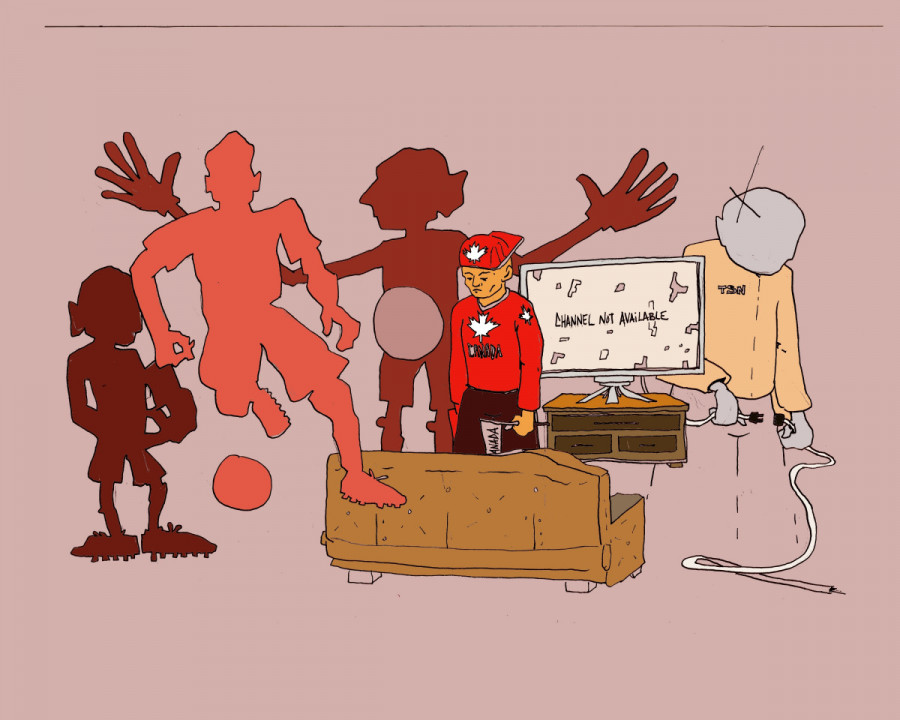Canadian Soccer Needs to Be More Accessible
Valuable Tournament Matches Go Unnoticed by Canadians
90 minutes away from their first trophy in 23 years, the Canadian men’s national soccer team suited up and took the pitch in Las Vegas with only their neighbours to the south standing in their way. Having vanquished Panama 72 hours earlier in the semi-final, Canada was in high spirits and as ready as they’ve ever been for an ultimate clash. There was no doubt about it, this was their biggest game since getting ousted from the 2022 FIFA World Cup in Qatar. There were enthusiastic fans back home who were eager to tune in. But they were in for a rude awakening.
Canada fell to the United States 2-0 in the final of the The Confederation of North, Central America and Caribbean Association Football (CONCACAF) Nations League on June 18th, and it was not available to watch on TV.
The CONCACAF Nations League encompasses the men’s national teams of all the North American, Central American, and Caribbean countries. Playing in the final of a continental tournament was a big deal for Canada. Out-performing regular World Cup participants such as Mexico, Panama, and Costa Rica is no easy feat. But it was an equally large disappointment that many Canadians were unable to watch.
The games were not broadcast on Sportsnet or TSN, thereby making paid streaming services such as OneSoccer or FuboTV the only options for Canadians to watch.
Not only did Canadians miss the tournament, but they could have missed an amazing story. Atiba Hutchinson, who made his first appearance for Canada in 2003 against the United States, announced that the Nations League final against the United States would be the final time he suits up for Canada before his retirement from international soccer. His record 103 appearances for the men’s national team will leave a legacy behind for future Canadian soccer players. He could have punctuated his international career by helping Canada to their first trophy in 23 years. Ultimately, it did not happen, but if it had, not enough Canadians would have known.
TSN carried coverage of Canada’s games at the 2022 World Cup, and will also carry the 2023 Women’s World Cup in July and August. Sportsnet carried OneSoccer’s coverage of Canada’s qualifying journey to the 2022 World Cup, but as of now, neither Bell nor Rogers (TSN and Sportsnet’s parent companies) carries Canadian soccer coverage full-time. In fact, Rogers refused to include OneSoccer as a linear channel in March 2023 because the number of valuable matches played is “too minimal to prove sufficient for a linear channel.” Rogers also described the Canadian Premier League as a “‘lower-level league’ with a modest following.” While that could be true, why not use your large platform to help grow the game in Canada? They were also worried about OneSoccer competing with Sportsnet. OneSoccer is included as a linear channel in Telus cable packages, but they are only available in certain parts of the country.
As the main rightsholder for the men’s national team, the women’s national team, and the Canadian Premier League, OneSoccer is an online streaming service that will cost $119.99 per year. The only people who will pay such a price are hard-core soccer fans. This is not a viable method for bringing in new fans who were enthralled by Canada’s World Cup appearance. What better way to turn those people into real soccer fans than by showing future important games on one of the country’s two major sporting networks? This is precisely why we have designated sports stations.
The wonderful thing about soccer is that there are always international tournaments. Canadians do not need to wait four years to see their national teams in action. The men’s team is currently competing in the CONCACAF Gold Cup, and will once again face the United States in the quarterfinals on July 9th. The women’s team, ranked seventh-best in the world, will play in the World Cup later this summer. The women’s World Cup will be available on TSN, but the Gold Cup is only available through paid streaming.
Perhaps most importantly, Canada is one of the hosts of the 2026 men’s World Cup. Being a host comes with certain perks, such as automatic qualification for the tournament as well as a guaranteed easier group than the albatross of a group that Canada faced in Qatar. The women’s team is one of the best in the world, and won the gold medal at the Tokyo Olympic Games in 2021. We are entering what could be a golden generation for Canadian soccer. It would be nice if Canadians could follow their national teams throughout the entire four year cycle instead of only tuning in for a few World Cup matches.







